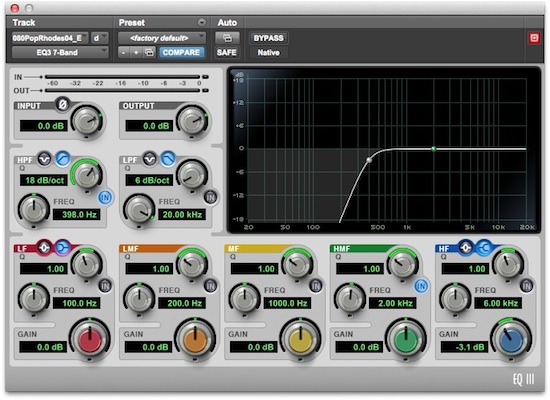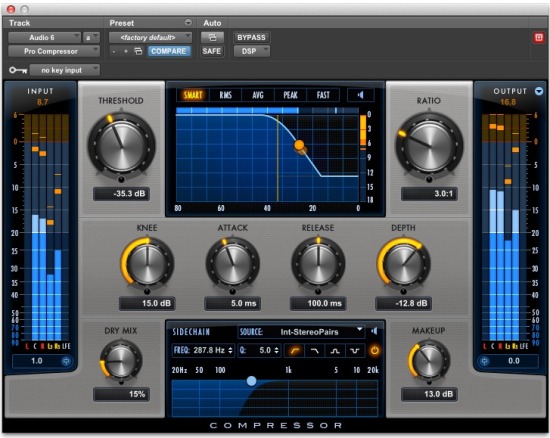Channel Strips - Help Or Hindrance When Mixing Part 3
In Part 1 and Part 2 of this episode I had already laid out my thoughts on Channel Strips and in particular the Avid Channel Strip, but after all of this criticism of Channel Strip, am I ignoring the shortcomings of the stock EQ3 and Dyn3 plugins?

EQIII
In the writing of this piece I will be the first to admit that I have subjected all of these plug-ins to an unusual level of scrutiny and the most interesting part of the process as far as the equalisers were concerned was that my overall impression that EQIII and the EQ section of Channel Strip were very similar in character was confirmed when I managed to null the two equalisers against each other almost completely. I tried this using Channel G and the SSL channel EQs and found it impossible to null to anywhere near the same extent. Not unexpected, but the two Avid EQs nulled to a far greater extent (but never completely). EQIII is a clean, workmanlike EQ, which is both well designed and effective and offers the band pass mode of which I am such a fan. If I have a criticism it would just be that it is a little dull and will never have“vibe”. A version offering the same user experience but with the option of a touch more glamour and excitement would be a big hit with me.

DynIII
I find the expander gate perfectly serviceable but, in line with Mike’s opinion of Dyn III, I find the compressor less than adequate on some sources. It tends to distort bass heavy material even with surprisingly long release times and with some material I really can’t use it.
My admittedly extensive reservations about Channel Strip have been significantly addressed by the release of the Pro series of plug-ins. I didn’t think there was any new ground to be broken in the area of compression but the Pro Compressor offers everything good about the Channel Strip compressor and builds on it significantly. The detection modes are useful and attenuation listen mode, which allow you to listen to the difference between the processed and unprocessed signals, is inspired and offers an invaluable aid to the understanding of compression, particularly the effect of attack and release times. Pro Expander offers useful additions such as upward expansion, a ducker, attenuation listen mode and a mix control which I still struggle to find a use for (parallel gating – really?). It might be useful with upward expansion. The Pro Limiter is a wonderful plug-ins but doesn’t really have an equivalent in the Channel Strip. These are now my go-to plug-ins and as they are available on all the systems I use at work they offer the same benefits to me as a stock plug-ins.

Pro EQ
All of this leads me to the conclusion that something I would really like Avid to do is to complete the Pro plug-inslineup with a Pro EQ. I would imagine this plug-ins could offer high quality EQ with the option of additional warmth and character, a dynamic mode similar to McDsp AE400 (after all dynamic EQ is just a highly specified de-esser), or even a tracking EQ like Surfer EQ, a properly implemented band pass mode, adjustable Q for the shelving filters and 6dB/Oct high and low pass filters, it could even offer a mix control like the Pro Expander so I could wonder what to use that for too.
Its always a good thing to look again at the tools you already have and while writing this piece I have examined both the Channel Strip itself and the reasons why I have avoided it in the past and I have changed my mind to a large extent. By setting up my own user default I have corrected several of the things I disliked about the factory default setting. I prefer a separate EQ and dynamics plug-ins but although EQIII sounds almost identical to Channel Strip, but is better specified, I find the Channel Strip dynamics much better than DynIII. By setting up a dynamics only Channel Strip default and using EQIII I have found what I want from the stock plug-ins without needing to go to third party plug-ins. The more closely I looked the more I found to like and I am using it far more than I did. I recommend you find a plug-ins you don’t use and find out what you are missing.
Julian Rodgers is an Avid Certified trainer and teaches audio production.